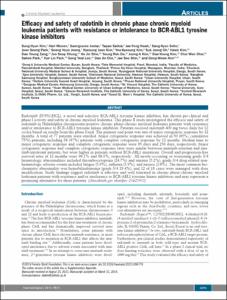KUMEL Repository
1. Journal Papers (연구논문)
1. School of Medicine (의과대학)
Dept. of Internal Medicine (내과학)
Efficacy and safety of radotinib in chronic phase chronic myeloid leukemia patients with resistance or intolerance to BCR-ABL1 tyrosine kinase inhibitors
- Keimyung Author(s)
- Do, Young Rok
- Department
- Dept. of Internal Medicine (내과학)
- Journal Title
- Haematologica
- Issued Date
- 2014
- Volume
- 99
- Issue
- 7
- Abstract
- Radotinib (IY5511HCL), a novel and selective BCR-ABL1 tyrosine kinase inhibitor, has shown pre-clinical and
phase I activity and safety in chronic myeloid leukemia. This phase II study investigated the efficacy and safety of
radotinib in Philadelphia chromosome-positive chronic phase-chronic myeloid leukemia patients with resistance
and/or intolerance to BCR-ABL1 tyrosine kinase inhibitors. Patients received radotinib 400 mg twice daily for 12
cycles based on results from the phase I trial. The primary end point was rate of major cytogenetic response by 12
months. A total of 77 patients were enrolled. Major cytogenetic response was achieved in 50 (65%; cumulative
75%) patients, including 36 (47%) patients with complete cytogenetic response by 12 months. Median time to
major cytogenetic response and complete cytogenetic response were 85 days and 256 days, respectively. Major
cytogenetic response and complete cytogenetic response rates were similar between imatinib-resistant and imatinib-
intolerant patients, but were higher in patients without BCR-ABL1 mutations. Overall and progression-free
survival rates at 12 months were 96.1% and 86.3%, respectively. All newly-occurring or worsening grade 3/4
hematologic abnormalities included thrombocytopenia (24.7%) and anemia (5.2%); grade 3/4 drug-related nonhematologic
adverse events included fatigue (3.9%), asthenia (3.9%), and nausea (2.6%). The most common biochemistry
abnormality was hyperbilirubinemia (grade 3/4 23.4%), and 12 of 18 cases were managed with dose
modification. Study findings suggest radotinib is effective and well tolerated in chronic phase-chronic myeloid
leukemia patients with resistance and/or intolerance to BCR-ABL1 tyrosine kinase inhibitors and may represent a
promising alternative for these patients. (clinicaltrials.gov identifier: 01602952)
- Keimyung Author(s)(Kor)
- 도영록
- Publisher
- School of Medicine
- Citation
- Sung-Hyun Kim et al. (2014). Efficacy and safety of radotinib in chronic phase chronic myeloid
leukemia patients with resistance or intolerance to BCR-ABL1 tyrosine
kinase inhibitors. Haematologica, 99(7), 1191–1196. doi: 10.3324/haematol.2013.096776
- Type
- Article
- ISSN
- 0390-6078
- Appears in Collections:
- 1. School of Medicine (의과대학) > Dept. of Internal Medicine (내과학)
- 파일 목록
-
-
Download
 oak-aaa-01940.pdf
기타 데이터 / 323.95 kB / Adobe PDF
oak-aaa-01940.pdf
기타 데이터 / 323.95 kB / Adobe PDF
-
Items in Repository are protected by copyright, with all rights reserved, unless otherwise indicated.